Just this month, three major companies have released 5G-compatible chips. How do these new processors size up with one another?
It’s no secret that 5G is supposed to be the next big technological revolution. In fact, some analysts predict that the industry will record double-digit CAGR between 2019 and 2027, making it a multi-billion dollar market.
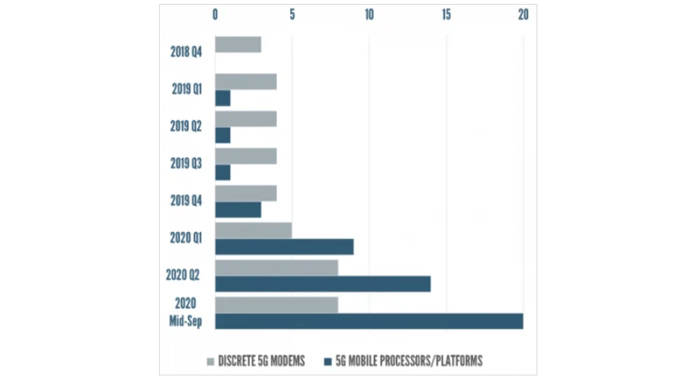
Underlying this increasingly lucrative field are major developments in RF hardware with all of the industry’s biggest names grasping for a share in the market. Just this month alone, Qualcomm, Samsung, and MediaTek have each released a 5G-compatible processor.
In this article, we’ll explore the features driving each of these releases and compare them by key performance specifications.
Qualcomm’s Boosted Snapdragon 870 5G Platform
An industry leader in RF, Qualcomm released its newest 5G mobile platform last week.
The company's new product, the Snapdragon 870 5G Mobile Platform, builds off the Snapdragon 865 Plus and is compatible with Wi-Fi 6 standards. Qualcomm says the chip is meant for mobile gaming and is expected to be the primary platform for coming mobile devices from companies like Motorola, iQOO, OnePlus, OPPO, and Xiaomi.
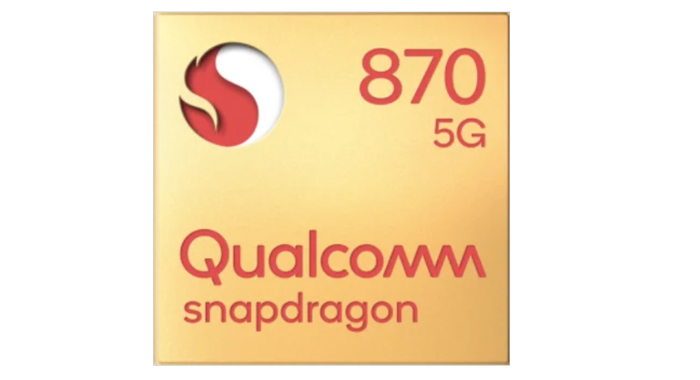
From a technical side, the chip is built on a 7nm process and integrates a Qualcomm Adreno 650 GPU. Some of the other processors on the chip include Qualcomm's Kryo 585 CPU (64-bit architecture), a slew of Qualcomm Hexagon processing units, and an image signal processor.
Specs
▪ Clock rates: 3.2 GHz
▪ Downlink speed: 7.5 Gbps
▪ Uplink speed: 3 Gbps
▪ AI performance: 15 TOPS
Samsung’s Exynos 2100 5G Mobile Processor
Next on the list is Samsung's new Exynos 2100 5G-integrated mobile processor.
The chip is the company’s first 5G-integrated mobile processor built on a 5nm extreme ultraviolet process node, also offering 20% lower power consumption than its 7nm predecessor. It offers an “octa-core” CPU with an Arm Cortex-X1 core, an Arm Mali-G78 GPU, and an image signal processor. Additionally, the device includes a subsystem consisting of three Cortex-A78 cores and four Cortex-A55 cores.
Samsung reports that Exynos 2100 can also connect up to six individual sensors.
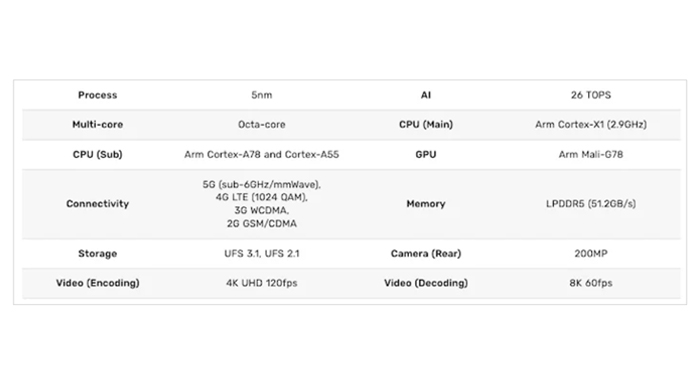
Specs
▪ Clock rates: 2.9 GHz
▪ Downlink speed (in sub 6 GHz): 5.1 Gbps
▪ Uplink speed (in sub 6 GHz): 1.92 Gbps
▪ AI performance: 26 TOPS
MediaTek's Dimensity 1100 and 1200 5G Chipsets
This week, MediaTek also added 5G chipset families to the market, releasing its new Dimensity 1100 and 1200 series.
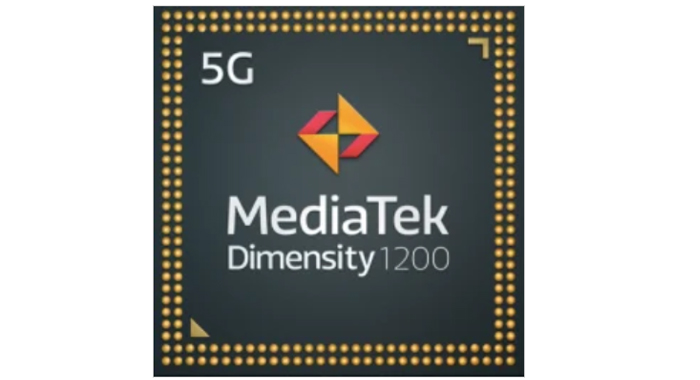
Built on a 6nm process node, the Dimensity 1200 also features an “octa-core” CPU. Additionally, this device features an Arm Cortex-A78 along with a subsystem of three Arm Cortex-A78 and four Arm Cortex-A55 efficiency cores. Interestingly, this is exactly the same CPU architecture as Samsung’s Exynos 2100. The chip features a nine-core GPU and six-core MediaTek APU 3.0 AI processor.
The Dimensity 1100 has a similar layout, but with an extra A-78 core, an Arm Mali-G77 GPU, and no APU. Note that MediaTek has not released TOPS metrics on either chip's AI performance.
Specs
1100
▪ Clock rates: 2.6 GHz
▪ Downlink speed: 4.7 Gbps
▪ Uplink speed: 2.5 Gbps
▪ AI performance: X
1200
▪ Clock rates: 3 GHz
▪ Downlink speed: 4.7 Gbps
▪ Uplink speed: 2.5 Gbps
▪ AI performance: X
Side-by-Side Comparison of the New Chips
While all three chipsets are very similar, there are some notable comparisons. For instance, Samsung’s chip claims the smallest technology node of the three at 5nm while Qualcomm touts the highest downlink and the highest clock frequency of the three at 7.5 Gbps and 3.2 GHz, respectively. However, Samsung’s chip offers the best AI performance with its 26 TOPS outperforming Qualcomm’s 15 TOPS.
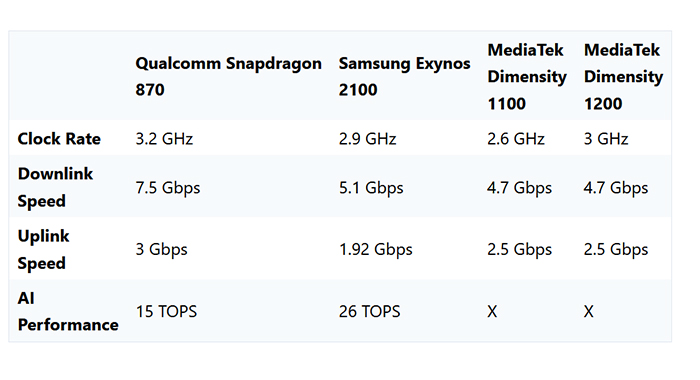
Interestingly, it seems that MediaTek’s CPU (and GPU) architecture is almost identical to that of Samsung’s. Both utilize the same processor core and GPU types in the same quantities. As with many design decisions, an engineer's choice of chip will largely depend on a specific application.